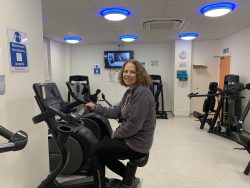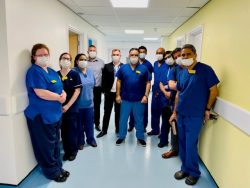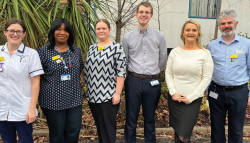Monthly archives: February 2023
We’re hiring – check out the latest vacancies at SWB!

SWB delivers care to a diverse local population. We are a vibrant Trust that celebrates our diversity; it’s what makes us special.
Our people are exceptional, and we all come together to offer the highest standards in patient care. Nurse, doctor, porter or admin – whatever your role, we all have a part to play.
We make up Sandwell, City and Rowley Regis Hospitals, Birmingham and Midland Eye Centre, Birmingham Treatment Centre, Lyng Centre and Leasowes Intermediate Care Centre. Plus, our community teams provide integrated services for children in schools, GP practices and at home.
Midland Metropolitan University Hospital is our new hospital, currently under construction, which stands proudly between Sandwell and West Birmingham. Once open in 2024, it will be a significant acute hospital within Birmingham and the Black Country. Bringing together specialties from all areas of SWB, it will provide a hub for emergency care, acute medical wards, maternity, general and specialist surgery.
If you would like to find your next move at SWB, check out our latest vacancies advertised internally and externally.
You can also contact the recruitment team via swbh.recruitment@nhs.net should you have any queries.
Are you using the gym appropriately?

We have recently received feedback and complaints from other users regarding misuse of the gym and equipment. Specifically, concerns have been raised over the playing of inappropriate music which other gym users have found offensive and impacted negatively on their gym experience. Additionally, equipment has been left blocking exits after use, which poses a health and safety risk.
We would like to remind colleagues when you sign up for the gym membership, you agreed to adhere to a code of conduct. We ask all colleagues familiarise themselves with the gym rules.
All colleagues deserve a clean, tidy, and welcoming environment as this is also important for wellbeing.
If you wish to report any issues to occupational health regarding the gym, please call 0121 507 3306.
Want to goin the gym? Please contact Jatinder Sekhon, by emailing jatinder.sekhon@nhs.net to complete your registration. The relevant forms can be found below
Heartbeat: Endoscopy training – national training centre

Please note the photograph used alongside this article in the print version of Heartbeat is incorrect. We apologise to the endoscopy team for the error.
Gastroscopy and colonoscopy are important diagnostic and treatment tools used for a variety of medical conditions and in order to ensure that colleagues are properly trained to use these tools, it is essential that they have access to high-quality training opportunities where they are able to get hands on.
Endoscopy training courses are an important and mandatory part of the Specialist registrar training and our Trust has now become a national training centre for endoscopy, delivering high quality endoscopy training.
To find out more, Heartbeat spoke to Imran Ghanghro, Consultant Gastroenterologist and Endoscopy Training Lead, he said, “We are fortunate that we have now been able to provide National Endoscopy Training Courses at SWBH, we are now a spoke centre for the West Midlands Training academy.
“We have conducted three training courses including Colonoscopy upskilling and two Train the Colonoscopy Trainer Courses so far and have received excellent feedback. As a part of being a spoke site for the training academy, we are also providing immersive training which is intense colonoscopy training for either surgical or gastro registrars identified by the deanery to help them improve the skill and increase the number of procedures.
“We have also delivered training and teaching at the Birmingham City University and our endoscopy staff has been helping with training courses. SWBH faculty also helped with BSG taster course at BCU in 2022 that was very much appreciated by the trainees. We have colonoscopy basic skills courses scheduled in the end of Jan as well as in March this year and we will be contributing to endoscopy training throughout the year.
“This is something that has been a long time in development, first outlined in 2019 but unfortunately held up with the onset of the COVID-19 pandemic. Now that we’re beginning to recover from the impact of COVID-19 we’re able to start reaping the benefit of our new training and development strategy. Crucially, we’re now a nationally recognised provider of endoscopy training, which attracts talented staff and consultants and ultimately leads to better quality care and outcomes for patients.”
For more information about the training opportunities available contact Imran.Ghanghro1@nhs.net
Understanding extremism: Training session
The understanding extremism training aims to enhance knowledge and awareness of extremist ideology, challenge terrorist narrative, understand drivers and influencing factors, safeguarding and referral processes, signs and symbols of extremist groups and how to promote cohesion.
The training will be delivered on the below dates by Sandwell Council:
- Wednesday 10 May
- Tuesday 19 September
- Wednesday 8 November
- Thursday 15 February (2024)
To find out more or book yourself on to one of the sessions, please email uzma_ameenbhatti@sandwell.gov.uk
Heartbeat: Safely managing patients during Technetium-99m shortage

At the back end of 2022, there was a global shortage of one of the most commonly used medical radioisotopes used in nuclear medicine and radiopharmacy departments at hospitals across the country including at our Trust.
Technetium-99m is used as a radioactive tracer and can detected in the body by gamma cameras. Having a relatively short half life, the isotope is well suited to a range of diagnostic procedures that give an insight in to the workings of various parts of the body.
“Technetium-99m is attached to a drug which carries it to the part of the body which is to be imaged. This is called a radiopharmaceutical, and the process has to be done on site in our specialist radiopharmacy unit for use the same day” said Joseph O’Brien, Consultant Physicist and Head of Nuclear Medicine.
“After it is injected into the body the radiopharmaceutical allows the team to analyse how the body is functioning.
“There are a wide range of studies it is used for, such as examining how well the stomach processes food, how well the kidneys are working, whether there is a problem with the blood supply to the heart, detecting prostate cancers in the bone, staging breast cancer and assessing for blood clots in lungs.
“In addition to this, surgical procedures for breast surgery rely upon technetium-99m for staging disease.”
During the shortage, the availability of technetium-99m became very restricted. The radiopharmacy team had to prioritise areas such as inpatients and surgical cases whilst other areas were postponed based on clinical condition. A traffic light system, developed during the COVID pandemic, was brought back into use to help prioritisation of patients. As SWB provides a regional radiopharmacy to hospitals in the West Midlands, the technetium-99m had to be shared equitably
“To combat the shortage a plan of action was put together,” explained Jilly Croasdale, Head of Radiopharmacy Department and Associate Director of Healthcare Science.
“We identified studies which could be safely postponed and prioritised studies which must go ahead, and then escalated these to an executive level. After this, we then communicated with patients and introduced weekend working temporarily to cover co-ordination of supply to and from other hospitals. As the situation changed on a weekly basis due to supply constraints, the plan was re-assessed twice a week.
“Our plan also helped to form the basis of national guidance and gave other departments strategies to mitigate shortages. This guidance was published on the British Nuclear Medicine Society website.”
Jilly believes without the swift action of her team and colleagues, the shortage could have been catastrophic for the service.
“In nuclear medicine, around 90 per cent of studies involve technetium-99m and so when there is a shortage it can be really challenging. However I am very lucky to be surrounded by colleagues who are talented, hardworking, who were not fazed by such an issue and are always willing to go beyond the call of duty.
“I must say a special thank you to everyone in the radiopharmacy and nuclear medicine teams, and in particular to Linda Burns, Nuclear Medicine Administrator, Shaun Johns, Radiopharmacy Production Manager, Becky Harrison, Radiopharmacy Quality Manager and Jenny ThompsonPeters, Nuclear Medicine Chief Clinical Technologist as without their due diligence, this would not have been possible.”
Newer items →